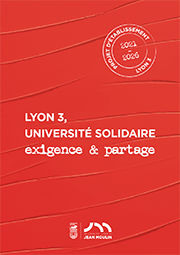AccueilRechercheLes productions scientifiquesThèsesThèses soutenuesThèses soutenues - 2006-2020Thèses soutenues - 2012
-
Partager cette page
- Recherche,
CHEN Fang Hwey
Temps et mémoire dans l’oeuvre de Chu Tien-hsin, la quête d'une subjectivité insulaire dans le roman taïwanais après 1987.
Publié le 3 janvier 2013 – Mis à jour le 30 janvier 2013
Thèse en Etude de l'Asie et de ses diasporas soutenue le 28 septembre 2012
La thèse s’intéresse au rapport entre temps et mémoire dans la littérature taïwanaise au lendemain de la levée de la loi martiale en 1987. Elle examine plus particulièrement la façon par laquelle la littérature reconfigure son époque comme un espace-temps spécifique. Le roman, genre peu codifié et donc caméléon, et qui s'enracine dans ce souci de mémoire et d'histoire, a fortement marqué la première décennie d'après 1987. L'œuvre de la romancière Chu T'ien-hsin, qui a pour thème central la mémoire, apparaît comme particulièrement représentative du foisonnement de la création romanesque d’après 1987 à Taïwan. C'est à partir de cette œuvre que l'on s'interroge d'une part sur ce vers quoi le désir, voire l'obsession, de raconter le passé pointe et d'autre part comment cette littérature, à son tour, réinvente sa propre mémoire. Dans une tentative d'éclairer la question de la mémoire et de l'identité qui hante une société en voie de mutation, ce travail s'articule autour des nombreux aspects de la mémoire, du temps et des formes qui y sont relatives. Grâce à cette articulation, l'analyse présente les formes de politisation, mais également de dépolitisation et d'a-politisation, qui émergent sur la scène littéraire contemporaine à Taïwan. L'analyse rend également compte de la manière dont ces formes sont en grande partie associées aux tourments et mutations de l'histoire. En cherchant à concilier l'analyse des conditions sociales de la production littéraire et l’étude des formes élémentaires de l'écriture, ce travail se fonde sur une double approche linguistique et culturelle de la traduction. Dans ce cadre, il est dès lors possible d'envisager une stratégie de la frontière qui permet de basculer entre deux cultures différentes dans le souci de proposer une lumière sur la littérature taïwanaise dans le contexte intellectuel français.
The dissertation focuses on the relation between time and memory in Taiwanese literature in the aftermath of the lifting of the martial law in 1987. It further examines how literature reconfigures its epoch into a specific space-time. The concern for memory and history is deeply rooted in the novel, a chameleon-like genre with few codes which has made a big impact in Taiwan in the first decade after 1987. The work of female novelist Chu T'ien-hsin, in which memory is the central theme, is representative of the creative expansion of the novel in Taiwan after 1987. Taking on an analysis of her novels, the dissertation interrogates on the one hand what the desire, or even the obsession, to relate the past points to, and on the other hand, how in turn, this literature reinvents its own memory. In an attempt to enlighten questions related to memory and identity which haunt a society in mutation, the dissertation is articulated around the many aspects of memory, time and their related forms. Through this articulation, the analysis presents the forms of politicisation, as well as the forms of depoliticisation and a-politicisation, which have emerged on the contemporary scene of literature in Taiwan. The analysis further presents how these forms are mostly associated with the torments and mutations of history. With the aim of accommodating the analysis of the social conditions of literary production with the study of the elementary forms of writing, the research is based on a double approach associating linguistic and cultural translation. It is then possible to consider within this framework a strategy of the border which allows to swing over between two different cultures, offering to shed a light of Taiwanese literature within the French intellectual context.
Mots-clés : Chu T’ien-hsin, roman taïwanais contemporain, écriture mémorielle, identité taïwanaise, littérature des juancun, pathologie du temps
Key words : Zhu Tianxin, contemporary Taiwanese novel, memorial writing, Taiwanese identity, juancun literature, temporal pathology
Directeur de thèse : Gregory LEE
Membres du jury :
JIN Siyan, Professeur, Université d'Artois
TSAI SHULING Stéphanie, Professeur, Université de Tamkang
DODANE Claire, Professeur, Université Jean Moulin Lyon 3
LEE Gregory, Professeur, Université Jean Moulin Lyon 3
Président du jury : Claire DODANE
Mention : Très honorable avec les félicitations du jury
Equipe d'accueil : IETT
The dissertation focuses on the relation between time and memory in Taiwanese literature in the aftermath of the lifting of the martial law in 1987. It further examines how literature reconfigures its epoch into a specific space-time. The concern for memory and history is deeply rooted in the novel, a chameleon-like genre with few codes which has made a big impact in Taiwan in the first decade after 1987. The work of female novelist Chu T'ien-hsin, in which memory is the central theme, is representative of the creative expansion of the novel in Taiwan after 1987. Taking on an analysis of her novels, the dissertation interrogates on the one hand what the desire, or even the obsession, to relate the past points to, and on the other hand, how in turn, this literature reinvents its own memory. In an attempt to enlighten questions related to memory and identity which haunt a society in mutation, the dissertation is articulated around the many aspects of memory, time and their related forms. Through this articulation, the analysis presents the forms of politicisation, as well as the forms of depoliticisation and a-politicisation, which have emerged on the contemporary scene of literature in Taiwan. The analysis further presents how these forms are mostly associated with the torments and mutations of history. With the aim of accommodating the analysis of the social conditions of literary production with the study of the elementary forms of writing, the research is based on a double approach associating linguistic and cultural translation. It is then possible to consider within this framework a strategy of the border which allows to swing over between two different cultures, offering to shed a light of Taiwanese literature within the French intellectual context.
Mots-clés : Chu T’ien-hsin, roman taïwanais contemporain, écriture mémorielle, identité taïwanaise, littérature des juancun, pathologie du temps
Key words : Zhu Tianxin, contemporary Taiwanese novel, memorial writing, Taiwanese identity, juancun literature, temporal pathology
Directeur de thèse : Gregory LEE
Membres du jury :
JIN Siyan, Professeur, Université d'Artois
TSAI SHULING Stéphanie, Professeur, Université de Tamkang
DODANE Claire, Professeur, Université Jean Moulin Lyon 3
LEE Gregory, Professeur, Université Jean Moulin Lyon 3
Président du jury : Claire DODANE
Mention : Très honorable avec les félicitations du jury
Equipe d'accueil : IETT
Documentation
Mise à jour : 30 janvier 2013



